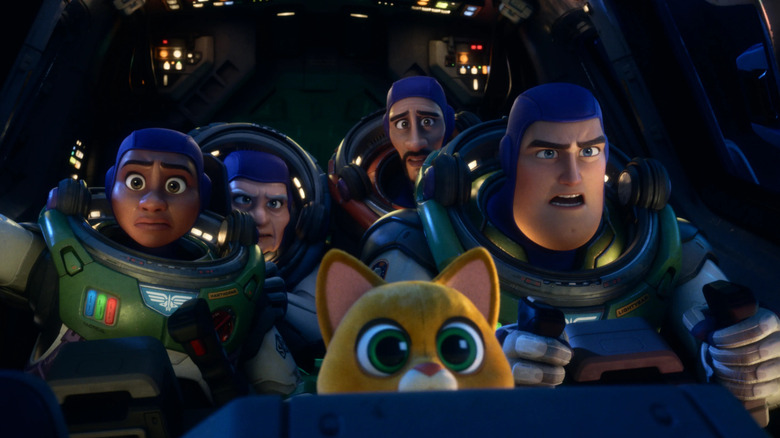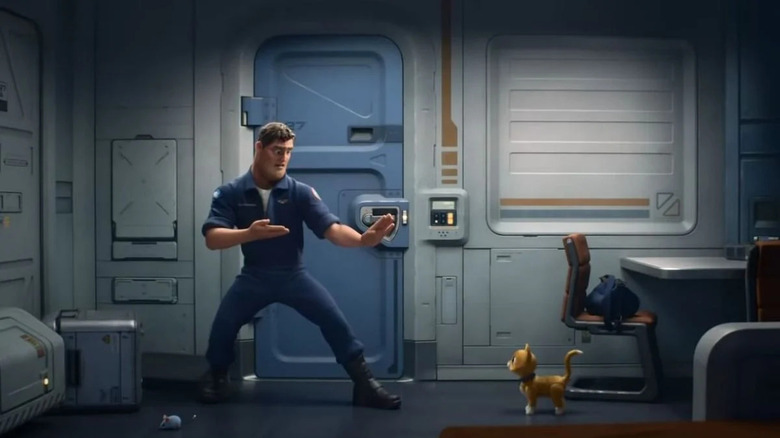Lightyear Review: No Signs Of Intelligent Life Anywhere
- Finally, some substantial LGBTQ representation in a Disney movie!
- The meta aspect of the film creates countless plot holes
- Borrows almost all of its plot points from better sci-fi films
- One of the silliest twists in recent memory
Everything that's wrong with "Lightyear" can be traced back to its very opening title card. Pixar's latest effort opens with onscreen text informing us that the film we're about to see was the favorite film of the human "Toy Story" protagonist Andy, his love for it inspiring his parents to buy him his very own Buzz Lightyear action figure. Director Angus MacLane, in his solo directorial debut, has gone even further in developing the lore around the space ranger. That action figure we're introduced to in "Toy Story" isn't from this film, he has argued in interviews, but instead tie-in merchandise to go along with the spin-off animated series that was created after this film's success within the "Toy Story" universe. Confused yet?
This convoluted explanation to the film's existence might initially sound like something that can be easily overlooked, but you don't have to be a nitpicking viewer of the Cinema Sins variety, ticking off all the movie mistakes rather than enjoying the film, to find that it overshadows your overall enjoyment. After all, what we're watching is essentially an origin story for the Buzz Lightyear character — so why does it feature so many winking meta nods that make no sense if they're pre-dating "Toy Story"? And why does a film that, within the franchise timeline, was made somewhere between the late 1970's and mid 1980's feature several scenes no conservative studio head would have allowed to be included as recently as five years ago? In any other film, these aspects would be a positive — but here, they merely emphasize that MacLane struggled to rise to the challenge of making an authentic post-"Star Wars" sci-fi blockbuster. The in-universe timeline proves to be an unnecessary constraint on what would otherwise be a fun (but admittedly throwaway) romp.
Caught in its own meta web
The one smart meta decision here is casting an A-lister like Chris Evans to do what amounts to nothing more than a Tim Allen impression, a winking suggestion that in the "Toy Story" universe, somebody of Evans' caliber refused to return to the recording booth to voice the action figure. We're introduced to his Buzz towards the end of a dangerous mission, which ends with him crash landing over 1,000 people on a resource-heavy but inhospitable planet 4.2 million lightyears from Earth. Naturally, he experiences guilt for causing everybody to be stuck here, so takes it upon himself to test out a new form of fuel in a test flight that could get everybody back home; unfortunately, he fails the first test, and comes back to the planet discovering that four years have passed in what was only four minutes for him. That's right folks, it's "Interstellar," Pixar-style, and perhaps the only time in history a Christopher Nolan film has triggered a greater emotional response than a "Toy Story" one.
Over the course of a montage director MacLane likely thinks is every bit as powerful as the opening sequence to "Up," we see Buzz try and fail the mission several times, his loved ones passing away — until one day, he crash lands decades further into a future overrun by robots controlled by the Emperor Zurg. To save the people on this planet, he must team up with an unruly band of rebels led by Izzy Hawthorne (Keke Palmer), the granddaughter of his best friend and fellow commanding officer Alisha Hawthorne (Uzo Aduba), who shares her grandmother's adventurous spirit, while remaining terrified of space.
Since Bill Condon, the director of Disney's live action "Beauty and the Beast" remake, remarked upon an "exclusively gay moment" in the film (which took place entirely in the background), scrutiny of lackluster LGBTQ+ representation in blockbusters has only increased. Pixar aren't immune from this — lest we forget the dreadful inclusion of a policewoman character in 2020's "Onward" who referenced having a wife in passing, a single line of dialogue that was subsequently edited out for international audiences in deeply conservative countries. "Lightyear" offers genuinely substantial representation, due to the prominence of Alisha Hawthorne, a lesbian character whose sexuality can't simply be erased by dubbing over her dialogue. We see her with her wife, her granddaughter becomes a major character, and she herself remains crucial to the narrative even as the years pass on. It's the bare minimum gay viewers like myself have been demanding of studios, but still feels refreshing after several years of characters who exist purely to talk about their partners in sequences that will be heavily re-edited for the Chinese and Russian releases anyway.
Quite unfortunately, this aspect is also one of the several ways the film clashes with the director's stated intention to make a believable science fiction blockbuster of the 1970's. Such extensive (at least compared to other studio blockbusters) representation remains a rare sight in a contemporary Hollywood production, so would feel completely out of place in a family adventure released in a much earlier era. Conservative studio executives were even nervous to leave the scene in the final cut as recently as April of this year, only changing their mind after a vocal backlash from fans. Due to the political climate the film is being released into, it feels harsh to criticize what amounts to substantive, positive representation in a film that will be seen far and wide. In this case, I might sidestep the criticism altogether and choose to believe the "Toy Story" universe has long been far more progressive than ours, so this thankfully would never have been an issue in a movie released there.
Not feeling the Buzz
There are certain ways in which the film attempts to mimic a blockbuster of the period, rather than closely follow the contemporary action movie mold. There's a tactility to the designs of the spacecraft and uniforms that do feel like a distinctively seventies vision of the future — where sci-fi writers couldn't envision touch screens and imagined everything would be controlled by an endless array of chunky buttons. This same approach is extended to the various robots, including Buzz's sidekick cat Sox (Peter Sohn), a character that feels cynically designed to sell merchandise to younger viewers and yet steals the show anyway. Perhaps the most period appropriate thing is the way the film liberally borrows ideas from the sci-fi movies that came before it. Most notably, Buzz going to hyper speed (a sequence that is unfortunately less effective after seeing Tom Cruise break the sound barrier in "Top Gun: Maverick") leads to an obvious "2001: A Space Odyssey" riff, complete with an AI companion straight out of the HAL playbook. In those moments, it feels exactly like the kind of tried-and-tested sci-fi a studio exec would green light after seeing the success of "Star Wars."
This isn't the first time Buzz Lightyear has been granted his own spin-off, with a 2D animated straight-to-DVD movie and subsequent Disney channel series in the early 2000's. But this is the first time a solo Buzz adventure has had the power to alter "Toy Story" canon — and it does so in ways that are distinctly underwhelming. The "Empire Strikes Back" riff in "Toy Story 2," revealing Emperor Zurg to be Buzz's father, is undone here for the sake of a shock twist which doesn't entirely make sense, only adding further confusion to the timeline. This might actually be the closest the film gets to "Star Wars," albeit unintentionally; the ill-conceived twist could lead to the same vocal backlash from die hard fans that greeted "The Last Jedi." It may only be a gag from "Toy Story 2" that's being contradicted here, but when we're considering a film has been with millions of viewers since childhood, even the tiniest detail being altered within the canon may lead to a viscerally angry response from the fans.
And then there are the many meta gags nodding to the original "Toy Story," even though this by its very nature pre-dates it within universe. If this film introduced Buzz as a hero spaceman, a character any kid would want an action figure of, why is he immediately introduced as the same type of laughing stock he was when voiced by Tim Allen? This has to be a fundamentally more heroic character for the series' subversion of that hero archetype to work. And yet, Buzz is introduced here monologuing to Star Command about his mission, before another character shows up to remind him he's talking to himself as the suit isn't connected to any internal system. Perhaps the most unbelievable thing about the film's meta logic is the idea that this uninteresting iteration of the character would go on to launch a beloved multimedia franchise and become any child's favorite toy decades later.
"Lightyear" might not be the worst Pixar film, but it's certainly the most disappointing. I can only hope that we won't ever see the sequels that audiences in the "Toy Story" universe were subjected to.


